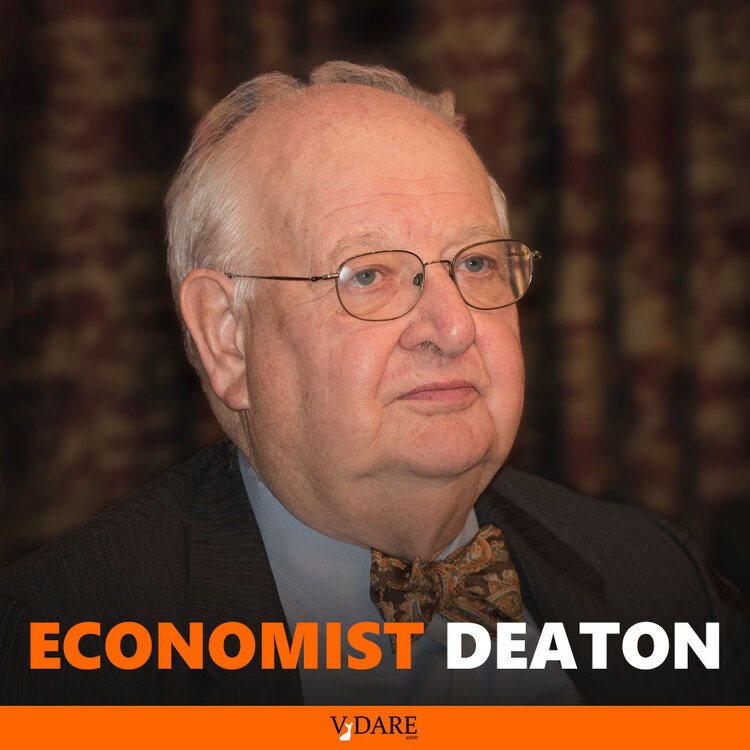
By Steve Sailer
03/11/2024
Angus Deaton was fortuitously awarded the (semi-) Nobel Prize in economics just a few weeks before his landmark paper (with his wife Ann Case) on the rise of “deaths of despair” among the American white working class was published in 2015. Because he had just had his name in the headlines for winning the Nobel, Case and Deaton’s crucial paper was given the attention it deserved upon publication.
Deaton has some second thoughts on economics:
[Comment at Unz.com]RETHINKING MY ECONOMICS
ANGUS DEATONMARCH 2024
Questioning one’s views as circumstances evolve can be a good thing
… Like many others, I have recently found myself changing my mind, a discomfiting process for someone who has been a practicing economist for more than half a century. I will come to some of the substantive topics, but I start with some general failings. I do not include the corruption allegations that have become common in some debates. Even so, economists, who have prospered mightily over the past half century, might fairly be accused of having a vested interest in capitalism as it currently operates. I should also say that I am writing about a (perhaps nebulous) mainstream, and that there are many nonmainstream economists.
- Power: Our emphasis on the virtues of free, competitive markets and exogenous technical change can distract us from the importance of power in setting prices and wages, in choosing the direction of technical change, and in influencing politics to change the rules of the game. Without an analysis of power, it is hard to understand inequality or much else in modern capitalism.
- Philosophy and ethics: In contrast to economists from Adam Smith and Karl Marx through John Maynard Keynes, Friedrich Hayek, and even Milton Friedman, we have largely stopped thinking about ethics and about what constitutes human well-being. We are technocrats who focus on efficiency. …
- Empirical methods: The credibility revolution in econometrics was an understandable reaction to the identification of causal mechanisms by assertion, often controversial and sometimes incredible. But the currently approved methods, randomized controlled trials, differences in differences, or regression discontinuity designs, have the effect of focusing attention on local effects, and away from potentially important but slow-acting mechanisms that operate with long and variable lags. Historians, who understand about contingency and about multiple and multidirectional causality, often do a better job than economists of identifying important mechanisms that are plausible, interesting, and worth thinking about, even if they do not meet the inferential standards of contemporary applied economics.
- Humility: We are often too sure that we are right
Second thoughts
Like most of my age cohort, I long regarded unions as a nuisance that interfered with economic (and often personal) efficiency and welcomed their slow demise. But today large corporations have too much power over working conditions, wages, and decisions in Washington, where unions currently have little say compared with corporate lobbyists.Unions once raised wages for members and nonmembers, they were an important part of social capital in many places, and they brought political power to working people in the workplace and in local, state, and federal governments. Their decline is contributing to the falling wage share, to the widening gap between executives and workers, to community destruction, and to rising populism. …
When efficiency comes with upward wealth redistribution, our recommendations frequently become little more than a license for plunder.
I am much more skeptical of the benefits of free trade to American workers and am even skeptical of the claim, which I and others have made in the past, that globalization was responsible for the vast reduction in global poverty over the past 30 years. I also no longer defend the idea that the harm done to working Americans by globalization was a reasonable price to pay for global poverty reduction because workers in America are so much better off than the global poor. I believe that the reduction in poverty in India had little to do with world trade. And poverty reduction in China could have happened with less damage to workers in rich countries if Chinese policies caused it to save less of its national income, allowing more of its manufacturing growth to be absorbed at home.
I had also seriously underthought my ethical judgments about trade-offs between domestic and foreign workers. We certainly have a duty to aid those in distress, but we have additional obligations to our fellow citizens that we do not have to others.
I used to subscribe to the near consensus among economists that immigration to the US was a good thing, with great benefits to the migrants and little or no cost to domestic low-skilled workers. I no longer think so. Economists’ beliefs are not unanimous on this but are shaped by econometric designs that may be credible but often rest on short-term outcomes. Longer-term analysis over the past century and a half tells a different story. Inequality was high when America was open, was much lower when the borders were closed, and rose again post Hart-Celler (the Immigration and Nationality Act of 1965) as the fraction of foreign-born people rose back to its levels in the Gilded Age. It has also been plausibly argued that the Great Migration of millions of African Americans from the rural South to the factories in the North would not have happened if factory owners had been able to hire the European migrants they preferred.Economists could benefit by greater engagement with the ideas of philosophers, historians, and sociologists, just as Adam Smith once did. The philosophers, historians, and sociologists would likely benefit too.
This is a content archive of VDARE.com, which Letitia James forced off of the Internet using lawfare.